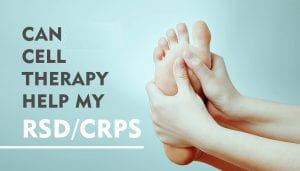Can Regenerative Therapy Help My RSD/CRPS?
Reflex Sympathetic Dystrophy, or Chronic Regional Pain Syndrome, is a painful disorder that is a result of a malfunctioning nervous system. Particularly, the autonomic nervous system is affected. This is the portion of the nervous system that monitors injury sites, which is why RSD/CRPS tends to develop after a traumatic incident or injury. RSD/CRPS causes sufferers to experience hypersensitivity and increased pain in reaction to a stimulus, or sometimes no stimulus at all. RSD/CRPS is notoriously difficult to control and there are often no good alternatives, however, at Piedmont Physical Medicine and Rehabilitation, we offer several treatment approaches, some of which are new – Regenerative Treatment for RSD/CRPS is one of them. Please keep in mind that the FDA distinguishes “Stem Cell” therapy from other regenerative therapies and they also restrict the use of Stem Cell therapy as an approved treatment.
What is Regenerative Medicine Treatment?
For several years, we have been performing regenerative treatments with great success for those with musculoskeletal disorders, such as degenerative arthritis and soft tissue injury, and certain peripheral arterial related conditions. The idea behind regenerative therapy is to use human cellular or tissue based products (HCT/Ps) or adipose derived structural support cells to provide pain relief of an affected area.
Alternatively, stem cells are capable of transforming into another type of cell with a specialized function. This makes them multi-functional for working in a variety of body locations. Stem cells are different than Platelet Rich Plasma (PRP) which is another regenerative medicine technique that contains active growth factors to help stimulate growth in tissue. PRP can behave like an activator to stem cells and “jump start” them or work all by itself to help concentrate your own growth factors at an injury site.
human cellular or tissue based products (HCT/Ps) may be placental derived. Adipose structural support cells are harvested from your own adipose (fat) tissue. Once the cells are harvested, they are applied to the affected area for use. Following FDA guidelines placental cells are typically isolated and frozen for later use. Adipose derived structural support cells are not processed before they are applied. The intent is to reduce pain or increase function. The treatment is fairly painless and is performed as an outpatient procedure with little downtime. For many, only one treatment is required, but further injections or complementary interventions intended to help achieve the best possible outcome may also be employed if necessary.
How Does This Help My RSD/CRPS?
A common result of RSD/CRPS is the restriction of blood flow in affected areas. RSD/CRPS most frequently occurs in the limbs. What sufferers notice is excessive pain, cold hypersensitivity, unusual sweating and changes in skin color. No one really knows why regenerative therapies can help RSD/CRPS (or exactly what may help RSD/CRPS regardless of what is tried) but one thought is that they increase blood flow to the afflicted tissue, therefore they help heal the injury site while offering pain relief. The intent is to try and help reverse many of the signs of RSD-CRPS. Although regenerative treatments don’t hold the cure to RSD/CRPS, they can provide a lot of relief for those suffering from the condition.
Our goal is to find the right treatment plan for you. If you have not found relief for your RSD/CRPS symptoms, then we can devise a program that caters to your specific condition. Since we have many treatment options available we are able to work with you to find the right one that will most likely help you.
We also don’t just rush into any particular treatment. Not only will we perform a thorough physical and history exam, we like to get to know you. While this can require a few visits, some diagnostic testing, and treatment to see what you may respond to, it will help us determine which treatment approach is best for you and to see if you are a candidate for regenerative therapy treatment. Call us at 864-235-1834 or contact us here to schedule an appointment.






